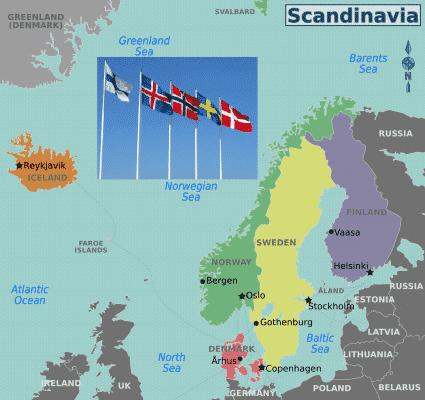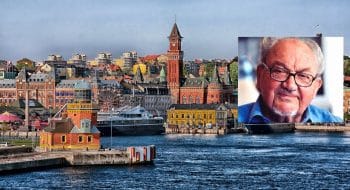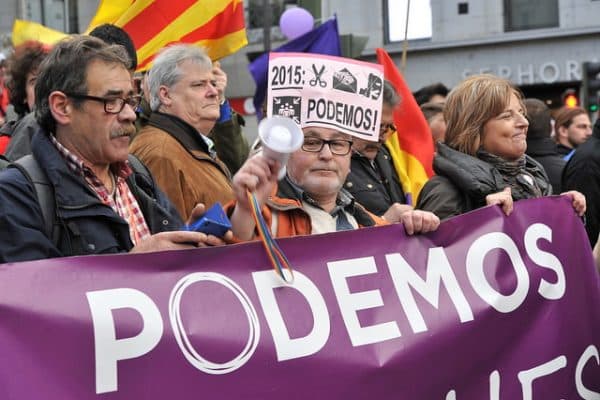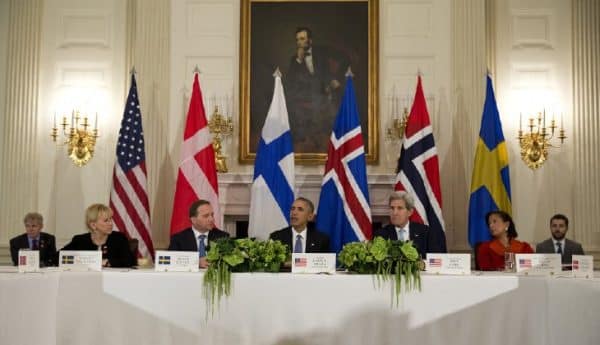Scandinavia on the Skids: The Failure of Social Democracy
An Interview with Czech Communist Theoretician Josef Skala – Part 1
FRONTLINE NEWS
Reports, News Flashes, and Commentary from Various Conflict Zones Around the Globe
This is a crosspost with the Center for Syncretic Studies (CSS), a fraternal organization which originated this material. Thank you, CSS.
=By=
Dr. Eduard Popov – (Translated by Jafe Arnold)
Harbingers of a “New-Old Left” Sprout in a Period of Deep Crisis for Humanity
 Eduard Popov is a Rostov State University graduate with a PhD in history and philosophy. In 2008, he founded the Center for Ukrainian Studies at the Southern Federal University of Russia in Rostov-on-Don. From 2009-2013, he was the founding head of the Black Sea-Caspian Center of the Russian Institute for Strategic Studies, an analytical institute of the Presidential Administration of Russia. In June 2014, Popov headed the establishment of the Representative Office of the Donetsk People’s Republic in Rostov-on-Don. He has actively participated in humanitarian aid efforts in his native Donbass and is a key contributor to various Donbass media, such as the Lugansk-based Cossack Media Group.
Eduard Popov is a Rostov State University graduate with a PhD in history and philosophy. In 2008, he founded the Center for Ukrainian Studies at the Southern Federal University of Russia in Rostov-on-Don. From 2009-2013, he was the founding head of the Black Sea-Caspian Center of the Russian Institute for Strategic Studies, an analytical institute of the Presidential Administration of Russia. In June 2014, Popov headed the establishment of the Representative Office of the Donetsk People’s Republic in Rostov-on-Don. He has actively participated in humanitarian aid efforts in his native Donbass and is a key contributor to various Donbass media, such as the Lugansk-based Cossack Media Group. Foreword by CSS Director Joaquin Flores—
 The Center for Syncretic Studies finds great satisfaction in providing the following eye-opening interview, conducted by our esteemed colleague, Dr. Popov of the Russian Federation, who asked a number of pertinent questions to Dr. Josef Skala, a prominent communist leader in the Czech Republic. What the CSS has noted in a number of articles on related subjects is that there has been a steady return to the fundamental principles of worker socialism, while at the same time developing a syncretism with other socio-political phenomenon which previous generations would have, perhaps then correctly, identified as alien-class forces. Nevertheless, the further development of capitalism in the late 20th century and early 21st century has increasingly proletarianized social strata that previously were excluded from the valorization process. But today, these social strata are proletarianized, a process that has advanced in direct proportion to the total subsumption of other facets of society by capital, which may also be described as the commodification of all spheres of life.
The Center for Syncretic Studies finds great satisfaction in providing the following eye-opening interview, conducted by our esteemed colleague, Dr. Popov of the Russian Federation, who asked a number of pertinent questions to Dr. Josef Skala, a prominent communist leader in the Czech Republic. What the CSS has noted in a number of articles on related subjects is that there has been a steady return to the fundamental principles of worker socialism, while at the same time developing a syncretism with other socio-political phenomenon which previous generations would have, perhaps then correctly, identified as alien-class forces. Nevertheless, the further development of capitalism in the late 20th century and early 21st century has increasingly proletarianized social strata that previously were excluded from the valorization process. But today, these social strata are proletarianized, a process that has advanced in direct proportion to the total subsumption of other facets of society by capital, which may also be described as the commodification of all spheres of life.
[dropcap]T[/dropcap]he results so far give an appearance which may at times be at odds with their class foundations. An inverse process has also taken place: social movements which may appear proletarian, are in fact bourgeois, even imperialist. Hence we arrive at a strange contradiction between appearances and reality: in the lands of central and eastern Eurasia, Cossacks, “people’s” Orthodox priests, and perhaps even new right intellectuals, on the one hand are engaged in a real battle for the economic program of liberation, of the socialization of the means of production. First world communists in the NATO-sphere, on the other hand, may call for increased imperialist adventurism in places like Libya, Ukraine, and Syria, either directly or indirectly, while calling for social policies that meet the needs of the libertine strata of urban petit-bourgeoisie, and have abandoned any real perspective of, or orientation towards, a working-class revolution. In its place is a type of post-modern reformism rooted in libertine identity politics, a simple divide and conquer tactic which essentializes everything but social class, and has abandoned the ‘people’ or ‘Laos’. Because laocracy can only be expressed in functional terms as socialism, and likewise, socialism is only possible when built by a Laos, it is clear that the division of people, their atomization, and the propagation of subcultural-identitarian politics is a bourgeois ideological tactic which was created to frustrate the development of socialism. This trend was forced upon once great communist parties in the former socialist bloc. It fails to even challenge the fundamental basis of the class rule of the bourgeoisie.
Dr. Josef Skala speaks to us, through Dr. Popov, about the burgeoning fight-back against this social-democratic/euro-communist trend. He, like many others have partly termed this as the ‘new-old left’. We are very excited about this and hope the reader will share our enthusiasm. This interview will be presented in two parts. We encourage broad distribution.
[dropcap]A[/dropcap]s we begin to introduce readers to news and developments from political life in the Czech Republic, we should recount some details on the activities of the Communist Party of Bohemia and Moravia (CPBM). The party emerged during the division of Czechoslovakia in 1990 and currently boasts the largest membership base in the country with around 40,000 members. For comparison, the ruling Czech Social Democratic Party has only around 15,000. In 1992, the communists had 320,000 members, which dropped to 140,000 in 1998, and then to 67,000 members in 2010. The main electoral base of the Communist Party is concentrated in former industrial centers in the provinces which suffer from problems with guaranteeing pensions and employment. The party, moreover, is a stable left party of the European, “Eurosceptic” type. In elections to the Czech Parliament, it has won from 10% to 19% of votes and from 22 to 41 seats out of 200. Out of the 21 seats reserved for the Czech Republic in the European Parliament, the communists have occupied from 3 to as many as 6 with their deputies working in cooperation with the European United Left–Nordic Green Left faction.
The party held its most recent congress in May 2016. Josef Skala, a reformer, doctor of philosophy, theoretician, historian, publicist, and former President of the International Union of Students, became the party’s candidate for the Czech presidency, throwing down the gauntlet before the party’s leader of many years, Vojtech Filip. Having almost no administrative resources whatsoever, Skala had also never held an official post in the party by the time of elections, and his electoral campaign was built entirely on the support of old and new friends. At the congress, Skala received 150 delegates’ votes while his opponent scored 203 out of a total number of eligible votes of 353. As a result, Dr. Josef Skala became the Deputy Chairman of the Party on ideological matters and the head of the newspaper “Hello, News” (Halo noviny). Even outside the Communist Party itself, Skala is respected as a burgeoning leader of the “new-old” Left. On the largest Czech internet portal, “Parliamentary Pages,” boasting daily traffic of up to 300,000 visitors a day, the following question was put to survey: “Who is the best candidate for chairman of the CPBM?” Out of 6,293 respondents, Vojtech Filip garnered 19%, Ivan Gruza 3%, and the responses “the worst because communists don’t deserve anything good” and “communists don’t interest me” were supported by 7% and 20% respectively. Skala won the poll with a total of 51%.
In this interview with Dr. Skala conducted in April 2016 and redacted for the Center for Syncretic Studies, the Czech communists’ relationship to several hot topics is explained through the lens of their “new-old” ideology.
Popov (P): Dr. Skala, the Communist Party of Bohemia and Moravia has undergone profound ideological changes since the collapse of the socialist block and the peaceful “divorce” of Czechoslovakia. How would you define the essence of these ideological changes? Are we dealing with a revision of Marxist-Leninist ideology and a drift in the direction of European Social Democracy?
Skala (S): Unprecedentedly forceful pressure has been put on the CPBM for it to “social-democratize”… In the majority of other countries, and not only former socialist ones, this pressure worked and those who gave in slipped into the political abyss – even in Italy, for example, where the communists once had 30% of the vote in elections. In our country, however, plans to programmatically castrate the party and attempts to drive it into isolation as a punishment for not surrendering were shattered. Communist ideals and movements have deep roots in the Czech Republic, more so than in a number of other countries. The convincingly positive results of our development under socialist [banners] also speak in our favor.
A fundamentally modernizing program, style, and method requires time. However, the seemingly unavoidable scheme of “state-induced reformist retreat” turned out to be more questionable than anything. Capitalism is in crisis and there are no humane or long-term solutions in its playbook. The exit from crisis lies beyond capitalism’s horizon. Today, we are still enduring intrigues leading to our “social-democratization.” Hence the ever-growing necessity of genuinely modernizing as soon as possible. Global capital does not only not want to offer people a way out – it simply can’t. Hence the need for a radically democratic program in the interests of and relying on the majority. We are the heirs of a party which not only managed to achieve this, but to an extent that wasn’t achieved elsewhere. Therein lies the hope for the light at the end of the tunnel.
P: The CPBM continues to be the most numerous political party in the Czech Republic and possesses one of the largest factions in the Parliament of the Czech Republic. What role does the Communist Party play in the political and social life of the country?
S: Our role is particularly notable from a comparative international perspective. We are well represented in the Czech and European parliaments and our members are also present in more than two-thirds of the country’s “regional governments.” You won’t find another such party which has not renounced the name “communist” and achieved anything similar in any other NATO and EU country.
P: How would you define the geopolitical and international program of the CPBM? What are the basic aims and tenets of this program?
S: If I were to express this briefly, then our aim is a world in which no one can claim the role of “chief of the globe.” This is in fact the point of democracy in relations between states. Therefore, productive dialogue and cooperation between forces whose goal is essentially the same is our aim. A multipolar, democratic architecture of international relations is a key condition for the state to take up the work of social progress after 30 years of continued asocial engineering.
P: The Communist Party of Bohemia and Moravia is, in your own words, a party of an ideological alternative and alternative worldview. How does the CPBM relate to events in the East of the former Ukraine, in Donbass?
S: Sympathy for Donbass, which dared to confront the terrorist coup in Kiev, is characteristic of all generations of Czech communists, and not only them. We are especially interested in what this bold experience will yield in political and socio-economic terms. Kiev’s ongoing “Anti-Terrorist Operation” has committed a series of war crimes against its own people. We support Donbass, especially as a source of inspiration for left forces in other regions of the world.
P: How do you see Russia’s role in European affairs in its present state and in the long term?
S: The attempt to keep Russia stuck on the bench in some kind of penalty box hurts all of Europe. This will end poorly just like all such actions in the past did. Even Charles de Gaulle came to the idea of Europe from the Atlantic to the Urals. Vladimir Putin has actualized this idea with the project of an economic and humanitarian bloc stretching from the Atlantic to the Pacific shores of the Far East. All of Eurasia benefits from this both economically and in terms of sovereignty and security for all European and Asian countries. It is only logical that the ruling oligarchy in the US does not like this. It orders its “nomenclature” in such countries as the Czech Republic to denounce anyone who openly resists Russophobia as “tools of Russian propaganda,” “paid agents of the Kremlin,” and even “Russian secret services.” This is a sort of farcical McCarthyism. No one has presented even the slightest proof of evidence for such claims to this day. And we, by the way, are not like those “dissidents” who were housed by foreign embassies and secret services. We are for friendly, constructive relations with Russia in the name of our country’s vital interests.
The “Putin-Lavrov-Shoigu” triangle draws ever-growing respect from among many of our people. Those more familiar with Russian issues would add to this list the names of Dmitry Rogozin, a colleague of mine in the international youth and student movements of my youth, or the academician Sergey Glazyev. Next to them, of course, are representatives of the intellectual elite who do not directly act in high politics, but enrich it with their ideas – Mikhail Khazin, Andrey Fursov, Valentin Katasonov, and a number of others.
To be continued in Part 2
Copyright © Center for Syncretic Studies 2016 – All Rights Reserved. No part of this article may be reproduced for commercial purposes without expressed consent of the author. Contact our Press Center to inquire. For non commercial purposes: Back-links and complete reproductions are hereby permitted with author’s name and CSS website name appearing clearly on the page where the reproduced material is published. Quotes and snippets are permissible insofar as they do not alter the meaning of the original work, as determined by the work’s original author.
=SUBSCRIBE TODAY! NOTHING TO LOSE, EVERYTHING TO GAIN.=
free • safe • invaluable
[email-subscribers namefield=”YES” desc=”” group=”Public”]
ALL IMAGES, CAPTIONS AND PULL QUOTES BY THE EDITORS NOT THE AUTHORS
But be sure to support YOUR media.
If you don’t, who will?
Denmark: Bernie Sanders for Prime Minister
![]() Ron Ridenour
Ron Ridenour
Author, Activist, Journalist

Map of Scandinavian nations. Flag insert photo by Hansjorn.
Scandinavia on the Skids: The Failure of Social Democracy
(Part 5 in a 7 part series on Scandinavia’s “Socialism”)
Now that Bernie Sanders is out of a presidential candidate job, some Danes want him to migrate to Denmark. The “Politiken” daily newspaper published a chronicle by Peter Ahrenfeldt Schroeder and Jakob Esmann, on April 28, 2016, heralding a new association, “Sanders for Prime Minister”.
“Bring Bernie to Denmark and make him Prime Minister,” they wrote. Their idea is that because Bernie Sanders is a leading advocate of traditional Danish social democracy, and since it is under serious attack, he would be an excellent candidate in the next Danish elections. Moreover, Sanders would collect taxes from the rich because a key issue in his campaign was the elimination of tax shelters, of which many Danish rich people partake with impunity.
One of Denmark’s most serious problems is that the Social Democrats and the more leftist parties do not believe that the people are actually capable of ruling sensibly. They don’t truly believe in participatory democracy, and they don’t think workers will fight so they go along with capitalism.
Since WWII, the Social Democratic party has led a dozen governments in seven periods, a total of 39 years. In one period, four successive S.D. governments ruled for nearly 15 years. The Liberal (Venstre) capitalist party has led governments in six periods, a total of 21 years. The Conservative party ruled just once but for ten years, and the Social Liberals ruled for three years. The self-styled workers party controlled governments 57% of the past 70 years. Nevertheless, since PM Anker Joergensen’s time (1972-82), one cannot tell the difference between the governments.
Many workers and middle class people are distressed because the welfare state/social democracy developed under the leadership of Social Democrats, whom they trusted, is being dismantled under its leadership. One in four Danes experience anxiety and/or depression despite the claim that they are the world’s happiest, as the American Medical Association reported in May 2014. http://archpsyc.jamanetwork.com/article.aspx?articleid=1847579.
Many feel afraid of just living. https://www.theguardian.com/science/blog/2014/may/14/mental-illness-happiest-country-denmark
Workers are stressed about losing their jobs, about companies packing up and moving to lower wage countries, of being forced to accept wage cuts. This threat is real, in part, because of the capitalist-dictated borderless European continent. Workers from poorer countries are encouraged to come to the wealthier ones and take jobs for less than union wages. Migrating workers are often helped by employers to cheat on the social welfare system by not paying taxes. Teachers are stressed because they must use less time in class preparation and more time “baby sitting” and filling out forms thanks to a 2013 lockout forced upon 67,000 teachers by the Social Democrat-Radical Liberal-Socialist Peoples Party government. Pedagogues of babies and small children also spend too much time filling out administrative papers, and due to cutbacks those remaining must care for too many children. College students have fewer scholarships, and have lost academic study opportunities because the government has eliminated “unnecessary” subjects to appease business interests. Many elderly and marginal persons are often stressed by racist/xenophobic political parties proclaiming that refugees-immigrants will take over Danish culture and religion, and commit terror.
Social Democrats are even ready to make an alliance with the anti-immigrant, anti-Muslim Danish Folkeparti (DF). Despite this capitulation to separatism, its abandonment of essential social democratic program, and support of US wars, Social Democrats are assisted by the allegedly more leftist Socialist Peoples Party (SF). This party grew out of the traditional pro-Soviet Communist Party. CP leader Aksel Larsen left his post to start SF, in 1959. SF sought a “third way” between social democracy and communism. It turned out Larsen had been a CIA informant.
In Socialist Peoples party’s early years it advocated social democratic programs and the peace movement. But it switched to support the neo-liberal Economic Union and joined the Social Democrat government in 2011. Its leader Villy Soevndal took the post of Secretary of State and supported US wars. SF support among voters has dived from nearly 15% to around 4%.
Then there is the even more self-proclaimed leftist Unity List party (Enhedslisten), which was created after the fall of the Berlin Wall by the traditional Communist Party, a Troskyist party and the Left Socialists. It too supported the peace movement but dropped out in 2008 when it made an alliance with the S.D. and supported its government in 2011-5, including its war against Libya. Unity List’s program today is a paled version of its original revolutionary one, seeking instead to reform capitalism with a raise in wage here and more hospital beds there.
Of course, the traditional capitalist parties (Liberals, Conservatives, Libertarians) are no slouchers when it comes to eliminating peoples’ benefits and in committing war crimes, but it is more depressing when the self-proclaimed pro-worker, socialistic parties scramble to compete.
Welfare state in disarray
Let’s look at what has happened to social democracy since the end of the Cold War. Back then everybody felt secure economically; at least no one lived in poverty or in fear. There was little violence, no Danes at war, no terrorism at home.
Now, since Denmark kills people who have done it no harm in the Middle East and Afghanistan, retaliation in the form of terrorism has hit Denmark. In February 14-15, 2015, one gunman killed two civilians and wounded three policemen in two occasions. The Danish-born youth was of Palestinian ancestry. He, like others who have attempted to harm artists who have mocked the Islamic Prophet Muhammad, acted against “blasphemy” and invasions of Muslim nations.
Before the fall of the European socialist-communist experiment, and pre-11/9 Permanent War Era, the Organization for Economic Co-operation and Development (OECD) placed Denmark at the top in health care, not only in financing but in quality. Today, it is in 19th place.
In cutting back on health care, the Social Democrats outdid the openly proud capitalist parties. Here are a few media headlines during the last Social Democrat-led government.
“Since 2007 every 6th hospital bed removed” (2014 headline after three years of S.D. government)
“Overflowing hospitals leads to more deaths”
“Doctors and nurses are furious: we can’t run faster”
“Undernourished patients starve in hospitals”
The numbers of beds removed from hospitals averages 507 per year in the past decade. This causes some hospitals to stack patients on beds in the aisles. Overfull hospitals experience ten percent greater deaths than normally.
Government cutbacks to public schools in the past decade are also prevalent.
“Spending on public schools has fallen 13%”
“4000 studies cut out”
“30% fewer university courses”
“11% fewer teachers”
“State scholarships fallen 3.7%”
“Educational grants fallen 19%”
Cutbacks in education continue in this first year of the traditional capitalist Liberal Party government: 500 university educators (7%) fired; government saves $300 million in education contribution this year and $1.4 billion savings planned; cuts of entire themes or many courses in natural science, health science, ancient history, contemporary society, law, theology.
Private schools, private hospitals, private transportation companies, private post offices at supermarkets served by untrained personnel emerge from neo-liberal deregulation and outsourcing of public services. One result is that the government pays greater fees to private hospitals and clinics for hundreds of thousands of patients who can’t be treated at public facilities because of the cutbacks. Of course, the rich can easily pay for quick services at private hospitals. There is no evidence that private service is more competent than public services.
Although one can’t determine that the nation actually gains anything from this idiotic policy what matters to governments is that the rich profit. Scandinavians are witnessing the same revolving door policy long in practice in the US—from government posts to big business and vice versa—and that keeps politicians close to the pocketbooks of the rich.
A good example of how the government looks the other way when capital seeks greater profits at the expense of workers health is the current scandal concerning the German-owned Siemens Wind Power company. In the past decade, 64 workers have become seriously sick and disabled due to exposure to dangerous chemicals (epoxy and isocyanat). The Danish Worker Environment Service and the Industrial Injury Board have allowed Siemens to operate without adequate safety controls, although they have known about the sicknesses. This decade-long “oversight” is so gross that TV news has covered the scandal, showing government officials acting bewildered about how this could have happened. A clear answer to such “bewilderment” is that one of the companies hired to oversee work security is a private concern, an outgrowth of deregulating industry.
A civil court just granted three worker plaintiffs $150,000 in “compensation” damages, which the company is to pay. The government has done nothing.
We see government neglect time and again in the food industry where retailers sell outdated food, and restaurants do not uphold health and safety regulations. The Danish Veterinary and Food Administration look causally on. We can read in an otherwise passive newspaper industry that so and so many have been stricken ill from eating bad meat, food that authorities allowed to be sold without significant consequences to the perpetrators. Sometimes a restaurant is dealt a fine or even closed down for some days, but the culprits don’t go to jail.
Welfare cash payments have been so drastically cut back that many are taken out of the system. In just the last two years, 70,000 people have been pushed out of the welfare daily cash system; 62,000 under the last Social Democrat-led government. This has plunged 16,400 of them under the poverty line, especially hitting single mothers. 11,000 additional children now live in poverty.
The “red” and “blue” governments cut back on day care centers and old-age homes too. Because of national government reductions to local districts some nursing home administrators feel forced to buy vacuum-packed meals delivered by private businesses, rather than cooking at the homes.
“My fantasy can not grasp that one can serve nine-day old meals that smell or nothing, taste of nothing, have no nutrition, just to save a million kroner,” a union leader told the newspaper, Metro, which tried to find politicians who would eat this food. There were no takers.
Social Democrats have no vision
A “Politiken” debate column, written by political science professor Erik Joergen Hansen, on March 21, 2016, points out the loss of social democratic values in Denmark.
“As far as I can tell, the Social Democrats have no vision. They just wish to follow the stream of the power elite…dismantling the welfare state for a competitive one,” Hansen wrote.
“Economic inequality has grown over several years. Nevertheless, it has been a long time since we see Social Democrats indicate that there should be greater distribution from the rich to the poor.”
Joergen takes on the current S.D. chairwoman, Mette Frederiksen, for her perspective that welfare policy should be one of “social mobility”. Hansen contends this would diffuse the traditional social democracy values based on social benefits, public services, narrowing the gap between rich and others. He says Frederiksen heralds the land of opportunities to become rich is now the goal, not to become equal or even fed well enough.
Joergen sees contemporary Danish Social Democrats in the same light as expressed by US sociology professors Stephen McNamee and Robert Miller in their book, “The Meritocracy Myth”. The American Dream is called such “because one must be asleep to believe in it.”
Social mobility, Joergen contends “does not create social ascent but rather individual ascent, for those who are the quickest”…”The consequence of such a strategy, in fact, is to increase societal inequality”, thus eradicating the very definition of social democracy, let alone socialism.
Next: Denmark: Rogue State
![]()
 is the author of six books on Cuba, (“Backfire: The CIA’s Biggest Burn”) plus "Yankee Sandinistas", “Sounds of Venezuela”, “Tamil Nation in Sri Lanka”. He has lived and worked in Latin America including in Cuba 1988-96 (Cuba's Editorial José Martí and Prensa Latina), Denmark, Iceland, Japan, India. www.ronridenour.com; email: ronrorama@gmail.com.
is the author of six books on Cuba, (“Backfire: The CIA’s Biggest Burn”) plus "Yankee Sandinistas", “Sounds of Venezuela”, “Tamil Nation in Sri Lanka”. He has lived and worked in Latin America including in Cuba 1988-96 (Cuba's Editorial José Martí and Prensa Latina), Denmark, Iceland, Japan, India. www.ronridenour.com; email: ronrorama@gmail.com.
=SUBSCRIBE TODAY! NOTHING TO LOSE, EVERYTHING TO GAIN.=
free • safe • invaluable
[email-subscribers namefield=”YES” desc=”” group=”Public”]
Nauseated by the
vile corporate media?
Had enough of their lies, escapism,
omissions and relentless manipulation?
Send a donation to
The Greanville Post–or
But be sure to support YOUR media.
If you don’t, who will?
Podemos and the Limits of the Neoliberal Order
![]() By Jorge Amar and Scott Ferguson
By Jorge Amar and Scott Ferguson
 In looking at the rise of the Podemos in Spain one has to also look at the rise of Syriza in Greece, and ask the question of the authenticity of these supposedly "left," populist, political parties. With the Syriza party, it seems that they were essentially a hoax, a strain of "non-left left", for as soon as they took power , they capitulated to the banksters without a whimper. The "hope of the people" was dashed upon the rocks before the ship left the dock, thereby leaving a very bad taste in the people's minds about the integrity of so-called left parties, for, despite initial fiery rhetoric, it showed even less backbone than the others.
In looking at the rise of the Podemos in Spain one has to also look at the rise of Syriza in Greece, and ask the question of the authenticity of these supposedly "left," populist, political parties. With the Syriza party, it seems that they were essentially a hoax, a strain of "non-left left", for as soon as they took power , they capitulated to the banksters without a whimper. The "hope of the people" was dashed upon the rocks before the ship left the dock, thereby leaving a very bad taste in the people's minds about the integrity of so-called left parties, for, despite initial fiery rhetoric, it showed even less backbone than the others.
Now we have a similar rise of a left, populist party in Spain and Italy, and as Amar and Ferguson state, they will need to "compromise" out of the gate, or they will immediately fail. In this context, besides questioning the analytical framework behind such statements, their seemingly tacit endorsement of reformist incrementalism and the economic approaches exclusively favored by mainstream (capitalist) theorists, why are they so sure that remaining true to their promises will immediately condemn such parties to defeat? The operative question —we are told—is "what will they compromise," and "how far will they go?" But underneath these questions we have to wonder if the instigation and popularity of these supposedly "left" parties is simply a ploy to discredit the entire concept of socialism, and thereby force a reaction from the people to go with a "right" or corporatist agenda. That certainly seems to be the pattern - particularly if we expand our frame to say Latin America. While we can hope that this is not the case, and that Podemos, despite its unpromising track record and bourgeois leadership, will somehow stand up for the good of the people, it also seems highly possible we are watching little more than political theater. Podemos and its ilk are essentially not true revolutionary socialist parties, but social democrats—at best, hence their willingness to play ball with the capitalists. That, indeed, is an old story with social democracy, which for generations has been happy to wield power to "manage" (or front) for capitalist regimes, albeit with varying welfarist faces. Welfarism is naturally better than savage free marketism, but the world is now at ahistorical stage when capitalism cannot be prolonged via mere socialist patches. It must be dealt a death blow and retired from the stage of history, or else all of humanity and the planet will be finished. This task these parties are loath to commit to or even envision. That's why in either case—Syriza and Podemos—it is the "left" brand that suffers a bad blow to its credibility and promise. RW/PG
No private character, however pure, no personal popularity, however great, can protect from the avenging wrath of an indignant people the man who will either declare that he is in favor of fastening the gold standard upon this people, or who is willing to surrender the right of self-government and place legislative control in the hands of foreign potentates and powers.
William Jennings Bryan, “Cross of Gold,” 1896
In the wake of Syriza’s utterly disappointing challenge to the EU Troika’s punishing austerity politics in the Eurozone, leftists around the globe are now turning their eyes, and hopes, to Podemos in Spain. Podemos grew out of the 15-M, or Los Indignados, anti-austerity protests back in 2011. The organization took myriad local government seats after forming an official political party in 2014. And as of the national parliamentary elections held in December 2015, Podemos has emerged as a viable third-party counterforce to Spain’s historically two-party neoliberal government. During the recent elections, the ruling, conservative People’s Party (PP) lost sixty-four seats, while the opposing Spanish Socialist Workers’ Party (PSOE) hemorrhaged twenty seats. Podemos, by contrast, earned sixty-nine seats, coming in just 300,000 votes behind PSOE and securing roughly 20% of the votes within the Spanish parliament. And in fourth place was Ciudadanos, the smaller, center-right “Party of the Citizenry.” Ciudadanos won a sizeable forty seats in parliament, but this was far less than early polling predicted.
[dropcap]C[/dropcap]ommentators have dubbed Podemos’ and Ciudadanos’ upset of Spain’s two-party system a political earthquake, while the international left is characterizing the battle ahead as source of great hope and an opportunity to bring real change to Europe. Here, however, we dampen the leftist enthusiasm surrounding the Spanish election, and regarding Podemos in particular, putting pressure on what we argue to be the party’s under-theorized and rather conservative program for economic change. Specifically, we offer a critique of Podemos’ commitment to so-called “sound finance,” as well as the tax-and-spend liberalism upon which its proposed solution to Eurozone austerity is supposed to hinge. But we also suggest a more promising way forward: that Podemos join forces with the fifth-ranking Unidad Popular party. Unidad Popular’s primary economist has turned to the heterodox school of political economy known as Modern Monetary Theory (MMT), coming to see what Podemos takes to be economic truths regarding the Eurozone as neoliberal myths that should be overtly politicized and rejected as such. By collaborating with Unidad Popular, we conclude, Podemos stands to not only pose a serious threat to Eurozone austerity, but also supplant the neoliberal order with an alternative and more just political-economic regime.
Political Crossroads
[dropcap]T[/dropcap]he general elections results that some people are characterizing as the end of the Spain’s hegemonic ’78 Regime are not quite as promising as such pronouncements let on. Podemos still lacks the necessary votes to command real power in the government, and the neoliberal bipartisanism comprised of the false choice between PP conservatives and PSOE socialists will continue to rule Spanish politics for some time. What Podemos’ electoral gains do represent is a crucial political challenge. Now it is time for Podemos to decide whether to openly collaborate with others, thereby creating a relatively stable government that can reverse austerity, or to refuse cooperation, likely forcing a new election cycle.
Though constrained in its own right, this is essentially Podemos’ decision to make. The dominant PP has no chance to win a working parliamentary majority without the endorsement of the PSOE. With an electoral base that is, demographically speaking, doomed, PP received more than 7,215,000 votes in the election, but lost more than 3,500,0000 votes from 2011. PSOE, meanwhile, saw its worst outcome since 1977: 5,530,779 votes, losing more than 1,500,000 since 2011. This leaves Podemos to negotiate between three future scenarios. None are certain. And each comes with its own rewards and pitfalls.
In the first scenario, the PP could form a government through more or less open cooperation with the PSOE and Ciudadanos. This arrangement would look something like the political makeup of the current German government. However, open collaboration may prove dangerous for the PSOE. As some regional leaders of that party are explicitly warning (if not threatening), the PSOE’s Pedro Sanchez should not rush too quickly to show support for the PP, since such an action may incite a mass defection of voters from the PSOE towards Podemos. Podemos’ recent gains have gone far to unmoor the decades-old truism that the PSOE is the Spanish left’s only feasible tool for combating PP conservatives, and the PSOE are now visibly worried.
Under a second scenario, the PSOE can attempt to constitute a new government by aligning itself with the third party, Podemos, and the fifth party, Unidad Popular. But this is also unlikely, considering the fact that Podemos rose to power by rejecting Spain’s bipartisan regime and calling for a new constitutional process. Podemos won its power from voters who resist the PP and PSOE duopoly, seeing both parties as more or less equally guilty of alienating the citizenry and exploiting the revolving doors between government, industry, and finance. Podemos disparages this class as the casta (caste) and vows to overturn it. To renege on this promise could prove politically deadly. One way to for Podemos to skirt this problem would be to demand the PSOE accept certain far-left measures, such as the referendum about Catalonia’s (and other regions’) “right to decide.” Podemos’ allies in these regions are unwavering on this issue, and persuading the PSOE to sign on to such a measure would go far to secure Podemos’ political base. Unfortunately, however, the PSOE has historically refused this policy and in all likelihood will not adopt it.
Finally, in a third scenario no coalitions are built between the reigning parties and we see a repetition of the same general elections in few months. This scenario is most likely, given the obstacles suggested above. In this case, the bipartisan regime will continue its decline and Podemos will use the PSOE’s rejection of its own faux leftism to erode more of the PSOE’s electoral base. Such a process may result in Podemos overtaking the PSOE and eventually taking command of parliament. But there are clearly many moving parts at work here, rendering the future of the Spanish left at once promising and uncertain.
Podemos’ Economic Program
[dropcap]S[/dropcap]uch are the political crossroads that Podemos and the Spanish left in general will face in the months ahead. But there is still another and, we would claim, more important matter to consider, and one that fundamentally shifts the ground beneath this unfolding story. This is the issue of political economy and specifically, the economic program Podemos aims to install, if and when it manages to take hold of parliament.
Surprisingly, Podemos’ economic platform has received inadequate critical attention by the leftist commentariat. This is especially true of English-language media. Much has been written about Podemos in the US, UK, and elsewhere. But such writing tends to focus on Podemos’ leader, Pablo Iglesias, and devote most of its energy to weighing the relevance of Podemos’ status as a popular political movement in relation to similar efforts around the globe. As a consequence, English speakers are offered little concrete discussion about the specific economic policies Podemos is proposing. Iglesias himself has published articles in English-language publications such as New Left Review, Jacobin, and The Guardian. These pieces explore political struggles, communication strategies, and grassroots organizing. Yet Iglesias devotes very few words to outlining Podemos’ economic program in such texts, leaving most English-language readers in the dark.
In truth, Podemos’ economic program has evolved quite a bit since the party’s initial formation. But this economic program seems to become more and more conservative as time progresses. At first, for instance, Podemos proposed a Basic Income Guarantee and debt relief for citizens, in addition to making more general promises about ending austerity. Yet month by month, Podemos has dropped both the Basic Income Guarantee and the debt relief program, as well as myriad other proposals. To be sure, the party remains committed to its central promise, which is to repair and expand Spain’s welfare state. But Podemos has conspicuously pared down its economic platform in compliance with the reigning economic orthodoxy in an effort to secure political legitimacy both within Spain and abroad.
The Trouble with Podemos
[dropcap]A[/dropcap]lthough Podemos’s grassroots-driven rise to power should be seen as meaningful and genuinely exciting, the party’s economic strategy is simply inadequate to win the political struggle it aims to conduct against the neoliberal order. The real problem with Podemos’ political economy lies less in the specific proposals the party is offering, but rather in the unreflected neoliberal assumptions that underlie the party’s shifting economic platform. First among these assumptions is Podemos’ apparently blind commitment to the doctrine of sound finance: the mythic principle that a healthy national economy requires government to balance its budget, whether in the short run or over the course of the business cycle. As Modern Monetary Theory (MMT) has shown, this principle is not only inimical to economic productivity, but also debilitating for equality and justice. Meanwhile, this principle rests upon another noxious maxim Podemos holds dear: the false notion that states are revenue constrained and that a government must tax before it can spend toward the public good.
The only scenarios under which a sovereign government might be constrained in this way, contend MMT economists, is when international gold standards or currency-peg agreements force states to accept debt obligations in a currency over which they assert little control. Such arrangements not only limit public spending to the tax revenues the state is capable of collecting, but also force governments to bend to the dictates of international creditors. Put another way, metal standards and currency pegs transform sovereign nations into de facto colonies of other political bodies.
This is why MMT economists such as Bill Mitchell have long spoken out against the bankrupt neoliberal logics that undergird the Maastricht Treaty. Signed in February 1992 by the members of the European Community in Maastricht, Netherlands, this treaty robbed European member states of their fiscal sovereignty and established the Eurozone as a monetary union without the strong fiscal union that would be required to support it. This has resulted in an abstract and especially cruel version of an old-time gold standard, which paradoxically forgoes any basis in gold bullion. Against the warnings of a dissenting minority, the Eurozone’s quasi-gold standard has crippled European nations by restricting public spending to a finite pool of value and in turn forcing governments into brutal debt agreements.
The dominant narrative sees the resulting sovereign debt crises as the crux of the Eurozone disaster, thought to be the consequence of profligate governments being unable to live within their means. However, these crises are mere symptoms of the Eurozone’s faulty structure. The true cause of this disaster is the Eurozone’s shackling of government spending to a false finitude and treating this subjugation as a natural state of affairs. Though written in somewhat technical language, Mitchell’s account of the Eurozone’s structural failings is instructive:
It is a basic characteristic of any monetary system that government can only create risk free liabilities if they are denominated in its own currency. … [However], the current design of the Eurozone determines that the Member State governments are not sovereign in the sense that they are forced to use a foreign currency and must issue debt to private bond markets in that foreign currency to fund any fiscal deficits. … The member state governments thus can run out of money and become insolvent if the bond markets decline to purchase their debt. … Their fiscal positions must then take the full brunt of any economic downturn because there is no federal counter stabilization function. Among other things, this means the elected governments cannot guarantee the solvency of the banks that operate within their borders.i
Governments require the political capacity to create money, or “risk-free liabilities,” on demand, Mitchell explains. Such powers are needed to maintain the solvency of banks, as well as to use fiscal policy to counter recessions and depressions. The Eurozone, however, strips member states of this spending capacity and requires them to borrow on international bond markets. The result transforms sovereign governments into cash-strapped debtors, makes economic recovery for individual nation-states impossible, and dooms the entire Eurozone system to failure.
Fellow MMTers L. Randall Wray and Dimitri B. Papadimitriou describe the historical consequences of the Eurozone’s lethal design as follows:
From the very start, the European Monetary Union (EMU) was set up to fail. The host of problems we are now witnessing, from the solvency crises on the periphery to the bank runs in Spain, Greece, and Italy, were built into the very structure of the EMU and its banking system. Policymakers have admittedly responded to these various emergencies with an uninspiring mix of delaying tactics and self-destructive policy blunders, but the most fundamental mistake of all occurred well before the buildup to the current crisis. What we are witnessing are the results of a design flaw. When individual nations like Greece or Italy joined the EMU, they essentially adopted a foreign currency—the euro—but retained responsibility for their nation’s fiscal policy. This attempted separation of fiscal policy from a sovereign currency is the fatal defect that is tearing the Eurozone apart.ii
As Wray and Papadimitriou have it, the Eurozone crisis is not the direct outcome of pro-business policymaking and anti-social austerity programs, as vile as these measures are. It is, rather, an effect of the calamitous finitude baked into the EMU project. The Troika can say, “Pay up!” and “Tighten your belts!” until they are blue in the face. But European governments will be structurally incapable of settling such debts as long as their monetary sovereignty remains fettered. To make matters worse, Germany’s tendency to hold money surpluses as the Eurozone’s net exporter further exacerbates the debtor positions of other member states. If the money supply is finite in the Eurozone and the German economy hoards its export profits, this means that there is simply not enough money to go around and that import-dependent economies such as Greece, Spain, and Italy will continue to suffer deficits no matter how successfully they manage to tax their distressed populations.
Europe’s phantom gold standard has not only immiserated populations, but also quashed Syriza’s resistance to the ongoing devastation in Greece. This is not merely because the Troika rejected what Greek finance minister Yanis Varoufakis consistently referred to as Syriza’s “modest proposal.” It is because, unlike during previous eras when metal standards were both popularly contested and philosophically denounced, neoliberal ideology has come to wholly naturalize the Eurozone’s shrouded cross of gold. This has made real transformation unimaginable, as Varoufakis and his team sadly discovered in July 2015.
For this reason, Podemos will have to directly thematize and politicize the Eurozone’s taken-for-granted finitude if it wishes to make meaningful and lasting transformations. First and foremost, this means reclaiming the state’s monetary sovereignty and boundless fiscal capacities. But it shall also require a major propaganda campaign, aimed at persuading ordinary people that the state is limited only by real resources and productive infrastructures and simply cannot run out of an abstract unit of account. It must be made clear that only by seizing government’s power to spend as needed can Podemos hope to end austerity and create the conditions for full employment and widespread prosperity. However, for all its leftist rhetoric and broad grassroots support, Podemos remains ill-equipped to end austerity since it does not dare imagine liberating Spain’s public purse from the Troika’s asphyxiating grip.
Podemos’ economic program is thoroughly consistent with the gold standard metaphysics of sound finance. Party leaders imagine they can simultaneously adopt this ideology and succeed in accomplishing what Syriza could not: acting against austerity while playing along with Eurozone budgetary rules. Upon these faulty premises, Podemos then treats what is in reality a very conservative tax-and-spend liberalism as the crux of its economic strategy. A Podemos-led government would seek to reverse social spending cuts by increasing some taxes, creating a slate of new taxes, and reinforcing the mandate of the AEAT (the Spanish equivalent of the IRS) of fighting tax evasion. Believing that public programs should be funded by this revenue, Podemos thus plans to tether the recovery and expansion of the Spanish welfare state to the futile task of fighting tax avoidance within a zone that permits free trade and capital movement. In such a zone, every private person and corporation can shuffle money easily between countries without notice. Barring a common tax authority and total multinational cooperation, even the most vigilant efforts to collect taxes are bound to fail.
Podemos’ chief economist, Nacho Alvárez Peralta, is quite explicit about the party’s devotion to sound finance and tax-and-spend economics. Alvarez expressly supports government budget-balancing. He breaks with the European Central Bank only on the timeline he asserts is required to achieve the criteria outlined by the Eurozone’s Stability and Growth Pact (SGP). Alvarez is also the architect behind Podemos’ tax-based strategy to fix the welfare state, which he presumes to be the only way out of the current mess.
Podemos thinks it can somehow accomplish what Syriza did not. However, it must learn the true lesson of the Greek fiasco: As long as a nation-state remains inside the Eurozone and subject to its SGP budget requirements, there shall be no alternative to austerity or the neoliberal order. And with the EU Commission’s latest demand that the next Spanish government cut another 9 billion euros to meet stringent deficit targets, the stakes of learning this lesson could not be higher.
Another Future
[dropcap]W[/dropcap]ith MMT’s critique of political economy in focus, a more promising way forward presents itself for the Spanish left, one that refuses the neoliberal premises that have come to frame Eurozone politics. As we suggested at the outset, this will require Podemos to join forces with Unidad Popular, an avowedly socialist and feminist party of the left now headed by economist and MMT advocate Alberto Garzón. As opposed to Podemos’ Iglesias and Alvarez, both Garzón and Unidad Popular’s chief economist, Eduardo Garzón (Alberto’s brother), hold a view of political economy that is very close to MMT’s understanding of monetary sovereignty, fiscal spending, and taxation. Garzón is well aware that Eurozone rules have perniciously, and needlessly, choked off the Spanish government’s spending powers, severely contracting what MMTers such as Stephanie Kelton refer to as the “fiscal space” that is necessary to sustain and enlarge a national economy.
In addition to restoring and developing the Spanish welfare state, Unidad Popular’s key economic proposal takes its cue from MMT’s idea for a federal Job Guarantee program. Garzón’s proposal is a modestly scaled version of MMT’s Job Guarantee. It is designed to provide community-focused, living-wage employment to Spain’s chronically under- and unemployed, which would not only provide immediate relief to destitute Spaniards, but also reverse the nation’s deflationary economy. Going beyond Keynesian pump priming, this Job Guarantee is meant to be a permanent public institution that expands countercyclically in lockstep with market downturns. If permitted to become a truly universal program, Spain’s Job Guarantee would serve a powerful new mediator of social production and value. In addition to setting just minimum standards for wages, working hours, and benefits, the Job Guarantee would carve out a larger space for public works that are free from market imperatives, place the program’s means of production in workers’ hands, socialize and compensate much unremunerated care work, and give everyday people a say in the shaping of their world.
What is more, Unidad Popular’s Job Guarantee scheme makes no mention of needing to meet the arbitrary budget goals of the SGP in order to fund such a program. This is because Unidad Popular roundly rejects the neoliberal premises of such goals. Indeed, if challenged by the Troika, the party is wholly prepared to set the crucial question before the body politic: Should we continue to obey the Troika’s crippling mandate in order to remain within the Eurozone? Or, shall we refuse the Troika’s dictates and risk ejection from the Eurozone? This is the question Syriza could not, or would not, ask. Yet what the Syriza tragedy has proven is that this is the key question upon which the fate of Europe shall depend.
Before the recent Spanish election, Podemos and Unidad Popular were in conversations to form a coalition. At the last minute, however, Podemos’ leaders broke off these talks for what we considered to be tactical reasons. Our hope is that there will be another chance to forge a coalition when the new elections are convoked. Of course, nothing will ensure the success of the Spanish left. All we have is our solidarity and commitment to struggle. But to fight against the neoliberal order while uncritically adopting neoliberal assumptions is to forfeit the contest from the start. Unless Podemos or any other leftist party is prepared to proffer a substantive alternative to the rules of the neoliberal game, we will no doubt suffer a disaster that is far greater than the one we are currently witnessing in Greece.
Such is the promise of MMT for the contemporary left: While MMT’s understanding of money as a limitless public instrument can free us from debt and austerity, its community-focused Job Guarantee provides means to build a new political economy, which transfigures social and ecological relations from the bottom up. Yet this is what other critical-theoretical appeals to MMT do not seem to comprehend. Reticent to appropriate and reshape the state apparatus, critics such as Nigel Dodd and David Graeber have called upon MMT’s understanding of money as a public balance sheet to challenge the inevitability of neoliberal power. In our estimation, however, MMT is more than a weapon for negating neoliberal domination. It is also a powerful tool for cultivating a positive and enduring alternative to the neoliberal catastrophe—first in Spain, then beyond.
Beas, Diego. 2011. “How Spain’s 15-M Movement is Redefining Politics.” Guardian, October 15. http://www.theguardian.com/commentisfree/2011/oct/15/spain-15-m-movement-activism.
Cañil, Ana R. 2015. “Alberta Rivera, el príncipe azul del Ibex 35.” El Diario, July 3. http://www.eldiario.es/zonacritica/Causas-meteorico-despegue-Albert-Rivera_6_363673650.html.
Carlin, John. 2015. “Los caballeros de la Mesa Redonda.” El País, January 27. http://politica.elpais.com/politica/2015/01/27/actualidad/1422384264_753104.html.
Castro, Irene. 2015. “Pedro Sánchez pacta con sus barones las líneas rojas de un acuerdo con Podemos.” El Diario, December 27. http://www.eldiario.es/politica/Pedro-Sanchez-barones-acuerdo-Podemos_0_467203568.html.
Council of the European Communities. 1992. “Treaty on European Union.” Commission of the European Communities. http://europa.eu/eu-law/decision-making/treaties/pdf/treaty_on_european_union/treaty_on_european_union_en.pdf.
El Diario. 2015. “Mariano Rajoy pide una gran coalición y no descarta ofrecer ministerios a PSOE y Ciudadanos.” El Diario, December 29. http://www.eldiario.es/politica/Mariano-Rajoy-PSOE-Ciudadanos-Gobierno_0_467903488.html.
Dodd, Nigel. 2014. The Social Life of Money. Princeton, NJ: Princeton University Press.
Errejón, José. 2013. “La crisis del régimen del 78.” Viento Sur, July 1. http://www.vientosur.info/spip.php?article7571.
Europa Press. 2015. “Podemos no permitirá un gobierno del PP pero condiciona su apoyo al PSOE al derecho a decidir.” El Economista, December 21. http://ecodiario.eleconomista.es/politica/noticias/7237104/12/15/20D-Podemos-no-permitira-un-gobierno-del-PP-pero-condiciona-su-apoyo-al-PSOE-al-derecho-a-decidir.html.
Ferguson, Scott. 2015. “Universal Basic Income: A Laissez-Faire Future?” CounterPunch, November 13. http://www.counterpunch.org/2015/11/13/universal-basic-income-a-laissez-faire-future/.
Garzón, Alberto. 2015. “The Problem with Podemos.” Jacobin, March 13. https://www.jacobinmag.com/2015/03/podemos-pablo-iglesias-izquierda-unida/.
Eduardo Garzón’s Twitter page. 2016. https://twitter.com/edugaresp (accessed April 19, 2016).
Godley, Wynne. 1992. “Maastricht and All That.” London Review of Books 14, no. 19: 3-4. http://www.lrb.co.uk/v14/n19/wynne-godley/maastricht-and-all-.
González, Bernardo Gutiérrez. 2016. “The ‘Podemos Wave’ as a Global Hope.” Open Democracy, December 20. http://www.opendemocracy.net/democraciaabierta/bernardo-guti-rrez-gonz-lez/podemos-wave-as-global-hope.
Graeber, David. 2011. Debt: The First 5,000 Years. New York: Melville House Press.
Iglesias, Pablo. 2015. “Politics Isn’t a Fairytale About Good Versus Bad.” The Guardian, December 21. http://www.theguardian.com/commentisfree/2015/dec/21/politics-isnt-fairytale-good-versus-bad.
Iglesias, Pablo. 2015. “The Spanish Response.” Jacobin, December 19. https://www.jacobinmag.com/2015/12/pablo-iglesias-interview-jacobin-podemos-spain-austerity/.
Iglesias, Pablo. 2015. “Understanding Podemos.” New Left Review 93: 7–22. http://www.newleftreview.org/II/93/pablo-iglesias-understanding-podemos.
Stephanie Kelton’s personal website. 2016. http://stephaniekelton.com/ (accessed April 19, 2016).
Lasa, Victor. 2015. “The New Spain: Between Uncertainty and Hope.” CounterPunch, December 22. http://www.counterpunch.org/2015/12/22/the-new-spain-between-uncertainty-and-hope/.
Lerner, Abba P. 1943. “Functional Finance and the Federal Debt.” Social Research 10, no. 1: 38-51. http://k.web.umkc.edu/keltons/Papers/501/functional%20finance.pdf.
Mecpoc’s YouTube channel. 2010. “Keynes Celebrates the End of the Gold Standard.” https://www.youtube.com/watch?v=U1S9F3agsUA.
Mendizabal, A. R. 2015. “Pablo Iglesias tranquiliza a Wall Street: ‘No hay alternativa a la economía de mercado.’” Capital Madrid, June 20. https://www.capitalmadrid.com/2015/6/20/38568/pablo-iglesias-tranquiliza-a-wall-street-no-hay-alternativa-a-la-economia-de-mercado.html.
Mitchell, Bill. 2012. “Budget Surpluses Are Not National Saving – Redux.” Bill Mitchell: Billy Blog, August 7. http://bilbo.economicoutlook.net/blog/?p=20536.
Mitchell, Bill. 2016. “Democracy in Europe requires Eurozone Breakup,” Billy Blog, January 6. http://bilbo.economicoutlook.net/blog/?p=32730.
Mitchell, Bill. 2015. “Demystifying Modern Monetary Theory.” Institute for New Economic Thinking, March 19. http://ineteconomics.org/ideas-papers/interviews-talks/demystifying-modern-monetary-theory.
Mitchell, Bill. 2013. “Options for Europe: Part 1.” Bill Mitchell: Billy Blog, December 31. http://bilbo.economicoutlook.net/blog/?p=26667.
Moreno, Felix. 2014. “50% Youth Unemployment in Spain Fuels Radicalization of Protests.” RT, March 24. https://www.rt.com/op-edge/radicalization-of-protests-in-spain-809/.
Myerson, Jesse A. 2015. “Monetarily, We Are Already In The Next System…” The Next System Project, October 8. http://thenextsystem.org/monetarily-we-are-already-in-the-next-system-we-just-dont-act-like-it/
Nelson, Fraser. 2015. “Political Earthquake in Spain as Podemos Takes 20pc of Vote.” The Spectator, December 20. http://blogs.spectator.co.uk/2015/12/political-earthquake-in-spain-as-exit-poll-shows-podemos-surging-to-22pc/.
Parguez, Alain. 1999. “The Expected Failure of the European Economic and Monetary Union: A False Money Against the Real Economy.” Eastern Economic Journal 25, no. 1: 63-76. http://college.holycross.edu/eej/Volume25/V25N1P63_76.pdf.
Pargeuz, Alain. 2011. “Guest Post: A Fresh Proposal for Escaping the Euro Crisis.” Yanis Varoufakis: Thoughts for the Post-2008 World. http://yanisvaroufakis.eu/2011/11/25/a-fresh-proposal-for-escaping-the-euro-crisis-guest-post-by-alain-parguez/.
Pérez, Claudi. 2015. “Bruselas señala que el nuevo Gobierno deberá recortar casi 9.000 millones.” El País, November 5. http://economia.elpais.com/economia/2015/11/05/actualidad/1446714490_704857.html.
Pierce, Dale. 2013. “What is Modern Monetary Theory, or ‘MMT’?” New Economic Perspectives, March 11. http://neweconomicperspectives.org/2013/03/what-is-modern-monetary-theory-or-mmt.html.
Rojer, Rebecca. 2014. “The Job Guarantee.” Jacobin, January 10. https://www.jacobinmag.com/2014/01/the-job-guarantee-video/.
Rojer, Rebecca. 2014. “The World According to Modern Monetary Theory.” The New Inquiry, April 11. http://thenewinquiry.com/essays/the-world-according-to-modern-monetary-theory/.
Rucinski, Tracy, and Finoa Ortiz. 2011. “Spain Protests Rock Nation, Tens of Thousands Fill the Cities Over Joblessness.” The World Post, May 21. http://www.huffingtonpost.com/2011/05/21/spain-protests-joblessness_n_865058.html.
Sánchez, Raúl. 2015. “La brecha generacional sostiene gran parte de los resultados electorales del PP.” El Diario, December 24. http://www.eldiario.es/politica/generacional-mantiene-resultados-electorales-PP_0_465803541.html.
Tortosa, María Dolores. 2015. “Susana Díaz se opone tanto a un pacto con el PP como con Podemos.” Ideal, December 22. http://www.ideal.es/andalucia/201512/22/susana-diaz-opone-tanto-20151222005459-v.html.
Unidad Popular’s homepage. http://www.unidadpopular.es/ (accessed March 24, 2016).
University of Groningen. 2012. “William Jennings Bryan Cross of Gold Speech July 8, 1896.” American History: From Revolution to Reconstruction and Beyond. http://www.let.rug.nl/usa/documents/1876-1900/william-jennings-bryan-cross-of-gold-speech-july-8-1896.php.
Varoufakis, Yanis. 2015. “Greece, Germany and the Eurozone.” Paper presented at the Hans-Böckler-Stiftung, Berlin, June 8. https://yanisvaroufakis.eu/2015/06/09/greeces-future-in-the-eurozone-keynote-at-the-hans-bockler-stiftung-berlin-8th-june-2015/.
Varoufakis, Yanis. 2013. “Modest Proposal. Yanis Varoufakis: Thoughts for the Post-2008 World. https://yanisvaroufakis.eu/euro-crisis/modest-proposal/.
Wikipedia. 2016. “Greenback Party.” http://en.wikipedia.org/wiki/European_troika (accessed April 19, 2016)
Wikipedia. 2015. “European Troika.” http://en.wikipedia.org/wiki/European_troika (accessed March 20, 2016).
Wray, Randall L., and Dimitri B. Papadimitriou. 2012. “Euroland’s Original Sin.” Levy Economics Institute of Bard College Policy Note 8: 1-5. http://www.levyinstitute.org/pubs/pn_12_08.pdf.
Wray, L. Randall. 2014. “Modern Money Theory: The Basics.” New Economic Perspectives, June 24. http://neweconomicperspectives.org/2014/06/modern-money-theory-basics.html.
Wray, L. Randall. 2014. “What Are Taxes For? The MMT Approach.” New Economic Perspectives, May 15. http://neweconomicperspectives.org/2014/05/taxes-mmt-approach.html.
i. Bill Mitchell, “Democracy in Europe requires Eurozone Breakup,” Billy Blog (blog), January 6, 2016, http://bilbo.economicoutlook.net/blog/?p=32730.
ii. Randall L. Wray and Dimitri B. Papadimitriou, “Euroland’s Original Sin,” Policy Note 8, July 2012, Levy Economics Institute of Bard College, http://www.levyinstitute.org/pubs/pn_12_08.pdf.
Source: boundary2 online
Note to Commenters
Due to severe hacking attacks in the recent past that brought our site down for up to 11 days with considerable loss of circulation, we exercise extreme caution in the comments we publish, as the comment box has been one of the main arteries to inject malicious code. Because of that comments may not appear immediately, but rest assured that if you are a legitimate commenter your opinion will be published within 24 hours. If your comment fails to appear, and you wish to reach us directly, send us a mail at: editor@greanvillepost.com
We apologize for this inconvenience.
 Nauseated by the
Nauseated by the
vile corporate media?
Had enough of their lies, escapism,
omissions and relentless manipulation?
Send a donation to
The Greanville Post–or
But be sure to support YOUR media.
If you don’t, who will?
Nordic Vassal States Pledge Support for America’s Imperial Project
![]() Dispatches from
Dispatches from
STEPHEN LENDMAN
 Leaders from Denmark, Finland, Iceland, Norway and Sweden arrived in Washington to kiss Obama’s ring. In a joint statement with their host, they recited the deplorable script handed them, pledging support for US-dominated NATO’s killing machine, its endless wars of aggression, its provocations against Russia and China risking direct confrontation.
Leaders from Denmark, Finland, Iceland, Norway and Sweden arrived in Washington to kiss Obama’s ring. In a joint statement with their host, they recited the deplorable script handed them, pledging support for US-dominated NATO’s killing machine, its endless wars of aggression, its provocations against Russia and China risking direct confrontation. So much for those “admirable” Scandinavians. It’s all over, folks. The American poison has taken.
They stressed the importance of upholding international law, breaching it in partnership with America. They condemned nonexistent Russian “aggression” and attempts to destabilize Ukraine – ignoring Moscow’s leading peacemaking role. They shamelessly called Crimeans’ self-determination right to rejoin Russia an “illegal occupation and attempted annexation.”
…
They reaffirmed support for Ukraine’s US-installed, Nazi-infested putschist regime. They back maintaining illegal sanctions on Russia, blaming it irresponsibly for US/Ukrainian efforts to undermine Minsk conflict resolution principles.
Here’s how a typical mainstream newspaper——reported the event under the headline, Nordic leaders reaffirm support for Ukraine, fret about Russian aggression, providing little or no true historical context. Note that, as usual, “Russian aggression” is taken for granted, an immutable truth that requires no proof.
They expressed concern for “Russia’s growing military presence” on its own territory – ignoring provocative US-led NATO’s buildup on its borders, its activated missile shield in Romania, intended solely for offense, targeting Russia, breaching the 1987 INF Treaty.
They hyped nonexistent threats instead of debunking them. They pledged subservience to Washington instead of asserting their sovereign independence.
They called terrorism and violent extremism major challenges, while failing to explain they’re US creations. They endorsed Middle East peace and stability while continuing support for endless US wars of aggression.
Stressing a “commitment to freedom, democracy, universal human rights and peace,” their policies flout them.
 STEPHEN LENDMAN lives in Chicago. He can be reached at lendmanstephen@sbcglobal.net. His new book as editor and contributor is titled "Flashpoint in Ukraine: US Drive for Hegemony Risks WW III." ( http://www.claritypress.com/LendmanIII.html ) Visit his blog site at sjlendman.blogspot.com.
STEPHEN LENDMAN lives in Chicago. He can be reached at lendmanstephen@sbcglobal.net. His new book as editor and contributor is titled "Flashpoint in Ukraine: US Drive for Hegemony Risks WW III." ( http://www.claritypress.com/LendmanIII.html ) Visit his blog site at sjlendman.blogspot.com.
=SUBSCRIBE TODAY! NOTHING TO LOSE, EVERYTHING TO GAIN.=
free • safe • invaluable
[email-subscribers namefield=”YES” desc=”” group=”Public”]













